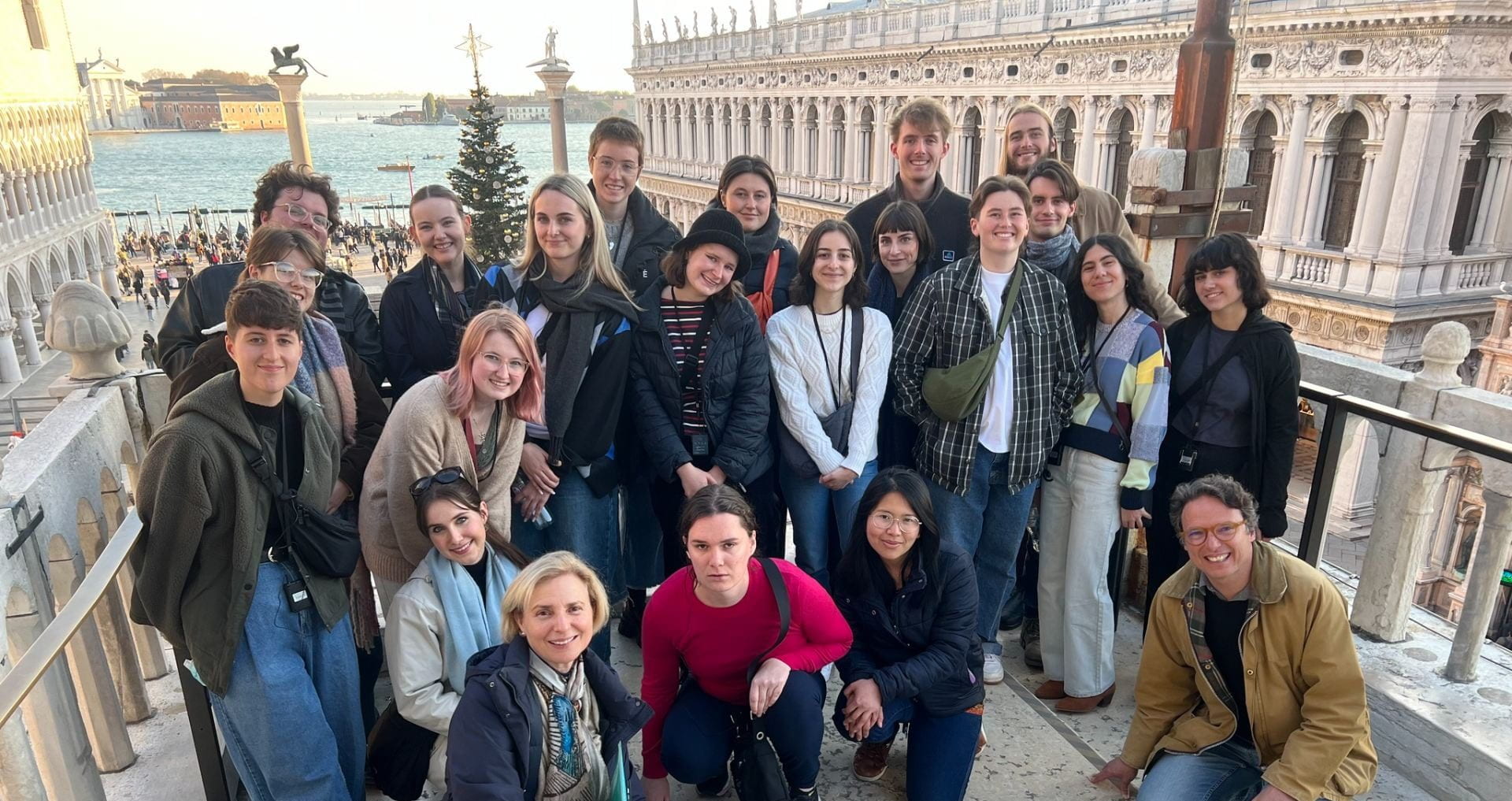
SHAPS Digest (December 2023)
Purushottama Bilomoria (Principal Fellow, Philosophy), along with David Woodruff (UC Irvine), wrote a piece in memorium of JN (Jitendra Nath) Mohanty (1928–2023) in the American Philosophical Association’s online Memorial Minutes 2023. Mohanty had a strong connection with philosophers in SHAPS and he visited Melbourne for conferences several times. His work is also used in a number of SHAPS philosophy courses.
Mark Edele (Hansen Chair in History, and Deputy Dean, Faculty of Arts) discussed the latest developments in Ukraine on ABC RN’s Saturday Extra.
Antonia Finnane (Professorial Fellow, History) discussed the upcoming Taiwan elections and their ramifications for the region, on the ANU’s National Security Podcast.
Grimwade Conservation Services‘ partnership with Ballaarat Mechanics Institute (BMI) on the conservation of the BMI’s collection of rare Australian plant specimens was featured on the University’s research website. This work was funded by a Victorian Living Heritage Program grant and supported by student volunteers from the Master of Cultural Materials Conservation program.
Madaline Harris-Schober (PhD in Classics & Archaeology, 2023) was featured on the Faculty of Arts website. Madaline has been awarded the international Palestine Exploration Fund-Albright Institute Fellowship by the W. F. Albright Institute of Archaeological Research (AIAR) Jerusalem.
Max Kaiser, Jewish Anti-Fascism and the False Promise of Settler Colonialism (Palgrave Macmillan, 2022), was reviewed in the journal Settler Colonial Studies. The reviewer found that the book offered a ‘useful and innovative approach to the study of settler colonial societies … by focusing on a non-founding migrant-settler group and how its identity is shaped by its status as a marginalised cultural minority in relation to the dominant settler colonists, and the Indigenous in Australian society’. Max Kaiser completed his PhD in History in 2019.
Iain McIntyre (PhD in History, 2018) discussed his new co-edited volume, Knocking the Top Off: A People’s History of Alcohol in Australia, on 3RRR Breakfast and Junkyard 3PBS. The book is co-edited with Alex Ettling; contributors include Wendy Bacon, Maggie Brady, Rowan Cahill, Bruce Carter, Carol Corless, Daniel A. Elias, Alex Ettling, Gary Foley, Alison Holland, Terry Irving, Phoebe Kelloway, Diane Kirkby, Tanja Luckins, Hamish Maxwell-Stewart, Chris McConville, Iain McIntyre, Lisa Milner, David Nichols, Michael Quinlan, Nick Southall, Jeff Sparrow, Janey Stone and Graham Willett.
Andonis Piperoglou (Hellenic Senior Lecturer in Global Diasporas, History) contributed to the writer’s desk segment of the online magazine KalliopeX.
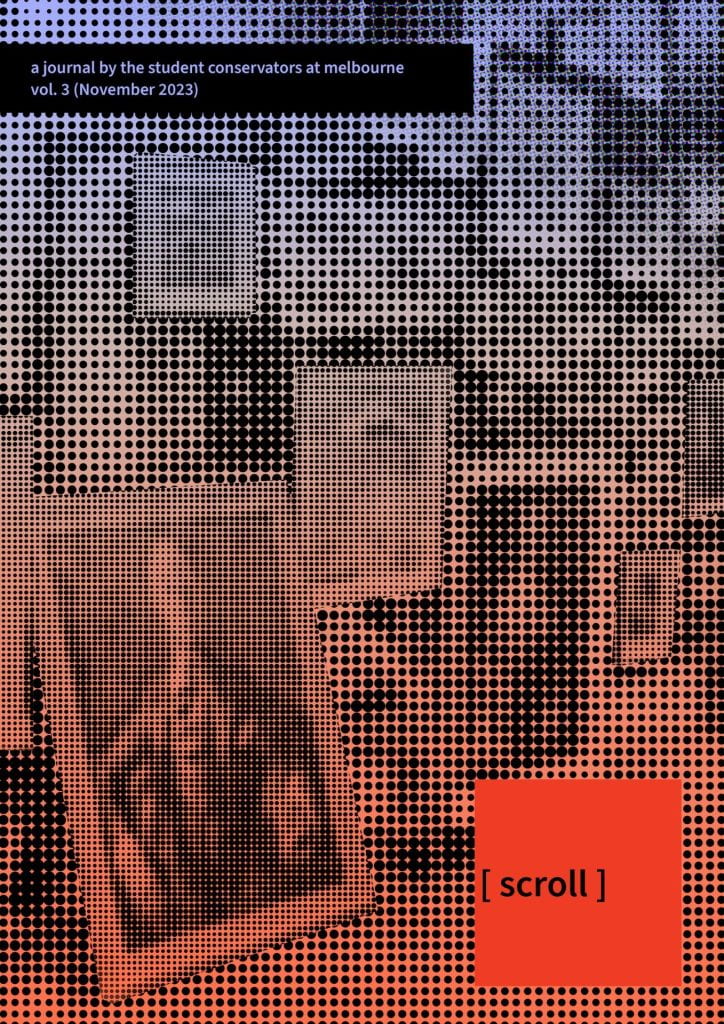
The third volume of Scroll, a journal by Student Conservators at Melbourne (SC@M) has now been published. It includes a foreword by Bella Lipson and Belle Williams (Co-Convenors, AICCM Emerging Conservators SIG), and features 13 informative and thought-provoking submissions:
- Vicki Car, ‘Welcome to the Lucky Country: Navigating the Complex Cultural Histories of Immigrant, Diasporic, and Refugee Communities’.
- Rachel Davis, ‘Single Objects, Many Stories: Sharing History as Conservation’.
- Sejal Goel, ‘All that Glitters is a Nightmare: Conserving Pride at the Missouri History Museum’.
- Emma Dacey, ‘Herbarium of Australian Flora: Cyanotypes Inspired by the History of Photographic and Botanic Science’.
- Fergus Patterson, ‘Old Problems, New Solutions: Conservation in Rural Australia’.
- Emma Ward, ‘Long Live the Dragons of Big Gold Mountain: Negotiating Reflexive Care of Chinese Living Heritage in Bendigo’
- Madeline Davies, ‘80 People, 7 Sites, 3 Days: Reflecting on APTCCARN 6 with the Minds Behind the Ambitious Program’.
- Isabella Wessel, ‘On Exhibitionary Silences: Museums and Conserving Sexual Heritage’.
- Kirralee Robinson, ‘What Does an Ecofeminist Mount Look Like? Implications of Ecofeminism in Contemporary Collection Management’.
- Melanie Melnychuk, ‘Golden Fields and Azure Skies: Dedications to a Faraway Homeland’.
- Anthi Soulioti, ‘Treating Artworks by Living Artists: The Precariousness of Co-creating Legacies’.
- Yuhong Zhang, ‘Five Methods for Matting Works on Paper: A Brief Introduction’.
- Fen Reyes, ‘Secrets of the Mountains: Reflections on Family Heritage, Personal Identity, Project Management and Mummies’.
The editors of this volume were: Joshua Loke, Emily May, Jonathan van Toor, Lauren Wolfram, Misty Wade and Holly Brown.
Academic Publications
Purushottama Bilimoria, with Andrew Irvine, ‘Postcolonialism and the Question of Global-Critical Philosophy of Religion’, in Nathan R B Loewen and Agnieszka Rostalska (eds), Diversifying Philosophy of Religion: Critiques, Methods and Case Studies. Expanding Philosophy of Religion Series (Bloomsbury Academic, 2023)
Postcolonialism refuses any proposal for a full-fledged philosophy of religion becoming the basis of ‘global’ comprehension. Instead, it names efforts to open up philosophy and culture to criticism and, more importantly, to transformation through communication with previously reduced and excluded others. Postcolonial and decolonial thinkers are engaged in a vital philosophical experiment of ‘epistemic disobedience’ to the norms of modern philosophy of religion, attending to and being altered by the reality of other worlds – worlds overlooked in the past, that perhaps present themselves to be recognised here and now, or that lure us as apprehensions of a future that could be – for the sake of creating a ‘pluriversal’ community of life marked by dialogical inclusion and appreciation. That pluriversality would include in a serious way Indigenous philosophical and spiritual traditions as well. Note that the ideal of pluriversality is not a rejection of universality as such, but a way of resituating it, away from a single, Eurocentric centre to an interrelated many.
For us (again, influenced by pragmatist thought), systematic theorising is fulfilled not in occupying a privileged and exclusive vantage-point from which to secure a vision of totality, but by repeated movement to think things through, from and with the insights of as many others as possible, because whatever – and whomever – has not been recognised by the community of inquirers before may hold possibilities for enlarging the community and enhancing its life. So, postcolonialism is not possessed by any compulsion to condemn outright the purported universality of ideals like liberty, equality, and fraternity. It commends them to be rethought and, most importantly, re-activated, to disrupt coloniality in a genuinely mutual pursuit of liberation, equity, and empathy for all. It is in this sense that postcolonialism is fundamentally philosophical, fundamentally, that is, a loving pursuit of wisdom.
Purushottama Bilimoria & Agnieszka Rostalska, ‘Diversity in Philosophy‘, in Sarah Flavel and Chiara Robbiano (eds), Key Concepts in World Philosophies: A Toolkit for Philosophers (Bloomsbury Academic 2023)
There are three ways of looking at the strategy for “diversity” in philosophy in a higher institutional setting. The first one entails changing the colour and gender of the faculty by appointing scholars of colour and ethnically-divergent background, but – and here is the rub – expect, indeed demand, of them that they continue to be compliant with the status quo, and therefore in heavily analytic departments do just that and not stray outside of the Anglophone perimeters or be lured into divergencies..
The second approach takes as its objective to diversify in the curriculum content so that there is increasingly a recognition of the diversity of the contemporary world we live in, and this moves away from what in politics might be called ‘partisan lines’. Here, the philosophical academy recognises that systems of thinking and reasoning, in short, philosophising, is not the one confined to the alleged roots of Greece and developed in Europe and the West.
The third, more critical, position diversifies in terms of both colour, ethnicity, gender as well as the subject matter (drawn from across several globally representative traditions). This is how the journal Sophia has diversified. And to consider as a possible response in the face of various threats from without that face the discipline of philosophy in these lean times in the academy when questions of application as well as well global relevance are asked for.
Nicole Davis (PhD in History, 2023/Forum), with Julie McLeod, Kevin Kevin Myers & Helen Proctor, ‘Mapping connections across fields of knowledge and international networks in the history of education: Australasia, Northern Europe and the United Kingdom’, in Andrés Payà Rico & José Luis Hernández Huerta (eds.), Conectando la historia de la educación Tendencias internacionales en la investigación y difusión del conocimiento (Octaedro, 2023) (Available open access)
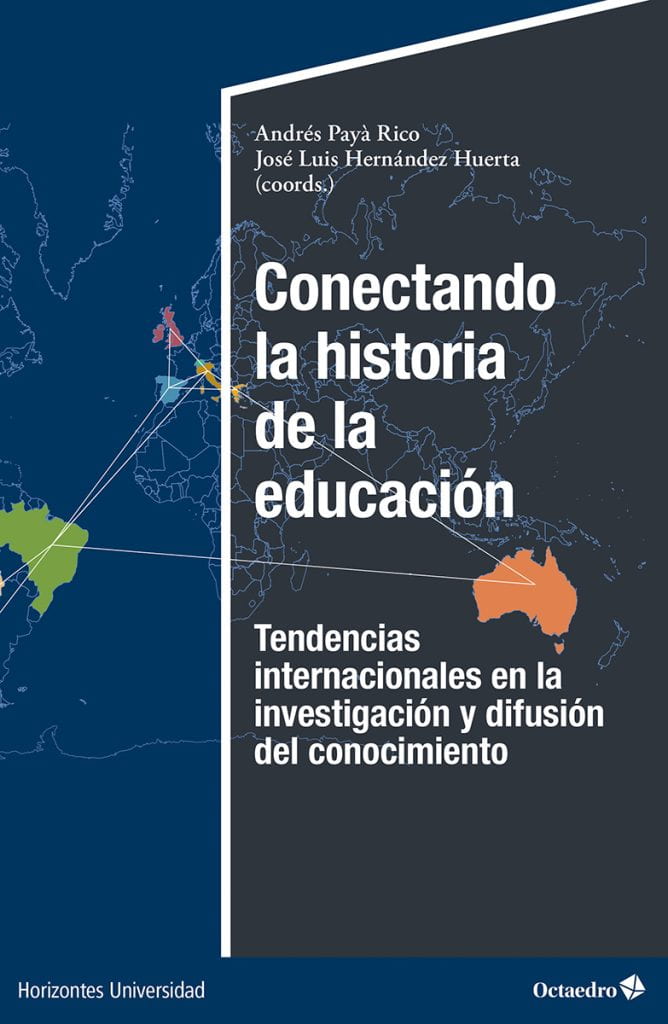
This chapter takes up the invitation to map the development of the history of education as a disciplinary field, traced through the activities of discipline associations and journals in two contrasting regions, Australasia and Northern Europe.
Defining and putting parameters around these regions is of course a problematic endeavour, replete with longer geopolitical and imperial histories, including the positioning of some regions, such as Australasia, as somewhat peripheral or marginal to developments in northern metropolitan centres.
While a full consideration of these matters is beyond the scope of the chapter, we note them at the start in order to signal the larger contexts both framing and unsettling these mapping exercises. There is also considerable heterogeneity within these broadly defined regions.
Even so, looking at them side by side has revealed some common concerns and also some important differences in how the journals conceived of their mission in relation to issues of national histories and international outlooks.
Jonathan Kemp (Cultural Materials Conservation), ‘Conservators, Creativity, and Control‘, Studies in Conservation (Available open access)
This article explores the role of conservators and focusses on their creative agency in the preservation of cultural heritage. It argues that conservators constitute a ‘recursive public’ who collectively make the field both highly collaborative and highly modifiable. The author then sets out how conservators engage in a form of ‘ontological constructivism’ where they use their creative agencies in adversarial, anexact, and generative processes and act as ‘art-developers’ to commit to the next version of a work.
Drawing parallels with software development, the author proposes that conservation should be seen as a form of version control that creates time-stamped ‘versions of record’ that persist until the next cycle of care. To emphasise the lack of finality in any artwork the author produces a series of ‘endgames’ to illustrate the ontologically open-ended nature of cultural heritage.
The article suggests that in exploring the distributed nature of creative agency through the lens of version control, conservation can provide greater understanding into the real conditions of art and cultural production and how they continue to evolve over time. This then helps disrupt conventional notions of authorship and allows conservation to contribute to a more inclusive understanding of art and culture in our institutions.
Gijs Tol (Classics & Archaeology) with Tymon de Haas, ‘The Analytical Potential of Intensive Field Survey Data. Developments in the Collection, Analysis and Interpretation of Surface Ceramics within the Pontine Region Project’, in Anna Meens et al.(eds), Fields, Sherds and Scholars: Recording and Interpreting Survey Ceramics (Sidestone Press, 2023) (Available open access)
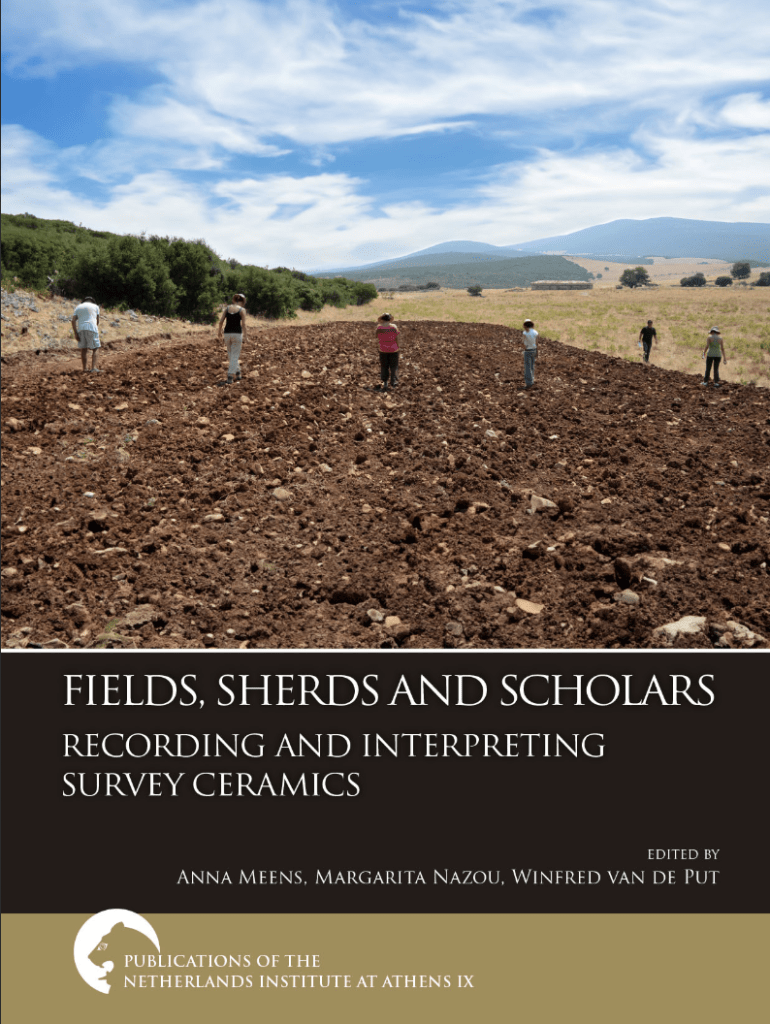
Landscape archaeology has heavily relied on pedestrian survey as a field method for more than half a century. In most field projects, archaeological ceramics constitute the lion’s share among the finds and the amount of collected sherds is overwhelming.
Survey ceramics provide the basis for understanding human activity in a landscape, and sherds serve as convenient chronological markers for the archaeological sites discovered in field projects. However, how this pottery is collected and studied determines the possibilities for using the sherds as a source material. Not only the collection practices, but also the process and practicalities of ceramic analysis are rarely made explicit, even though the archaeological interpretations of human activity in the landscape strongly rely on it.
In this text, the authors highlight the evolution of survey and sampling strategies of the Pontine Region Project and reflect on the trade-off between analytical potential and research intensity.
The latest issue of the journal Sophia: International Journal of Philosophy and Traditions is a special issue, ‘Steps to a Global Thought: Thinking from Elsewhere’. It features a tribute to the late Patrick Hutchings (26 October 1929–1 September 2023) (Honorary Research Associate, Philosophy, and long-time Editor-in-Chief of Sophia) by Anna Hennessey, with input from Sophia‘s Editor-in-Chief, Purushottama Bilimoria (Professorial Fellow, Philosophy) (Available open access).
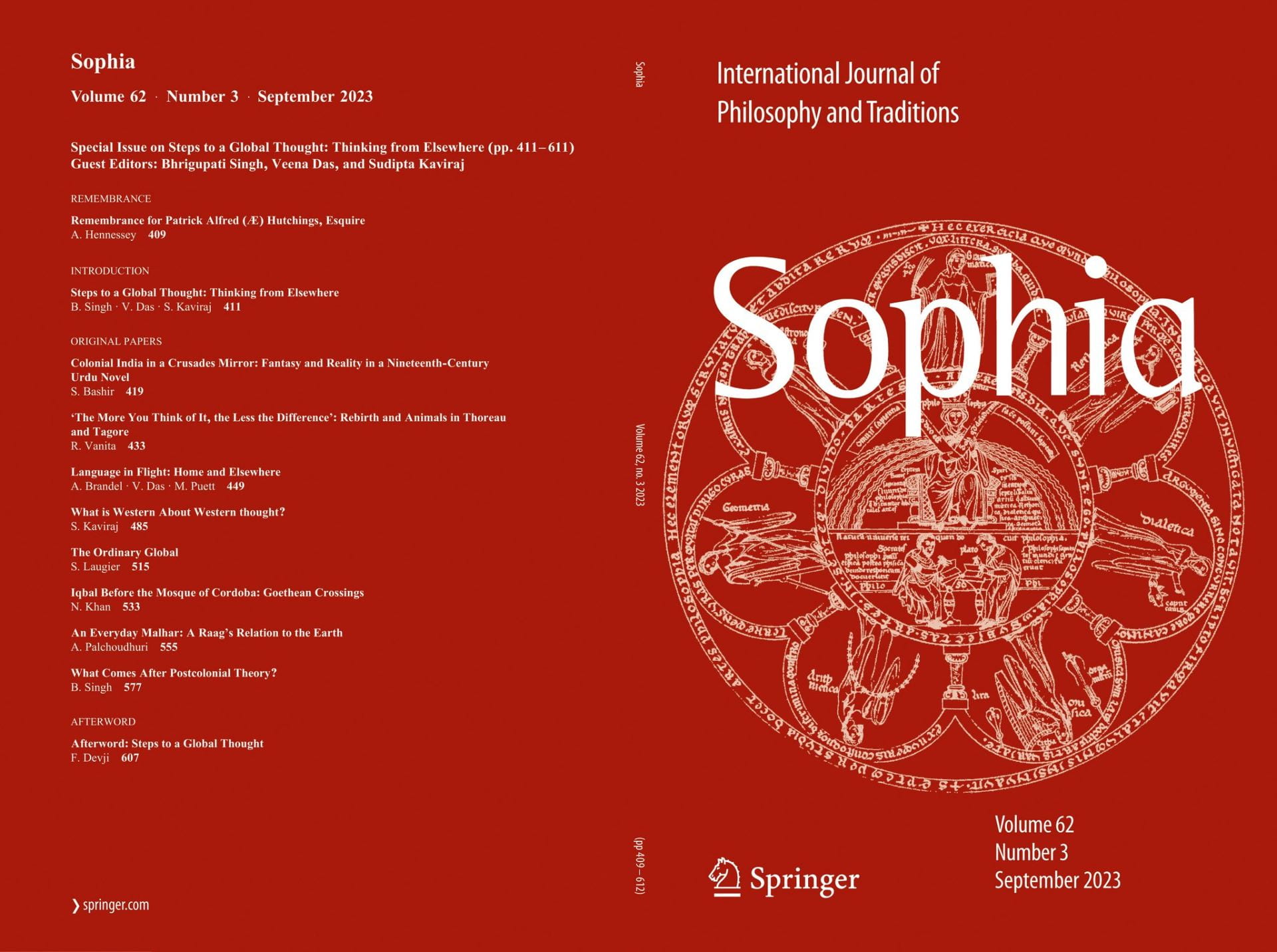
Awards & Appointments
The Faculty of Arts conferred three Honorary Doctorates within SHAPS. The awardees were: Professor Sheila Fitzpatrick, a distinguished Soviet Union historian of more than 50 years; Mr Djambawa Marawili, a highly respected Indigenous artist and community leader; and Professor Alexandra Walsham, a professor of religious and cultural history of early modern Britain.
Purushottama Bilimoria has been elected Fellow of the European Academy of Sciences and Arts.
Kate McGregor (History) has been appointed Associate Dean (International) of the Faculty of Arts.
Molly Mckew (PhD in History, 2019) has been appointed Publicity Officer for the History Council of Victoria.
And, finally, warmest congratulations to all our students who graduated this December!
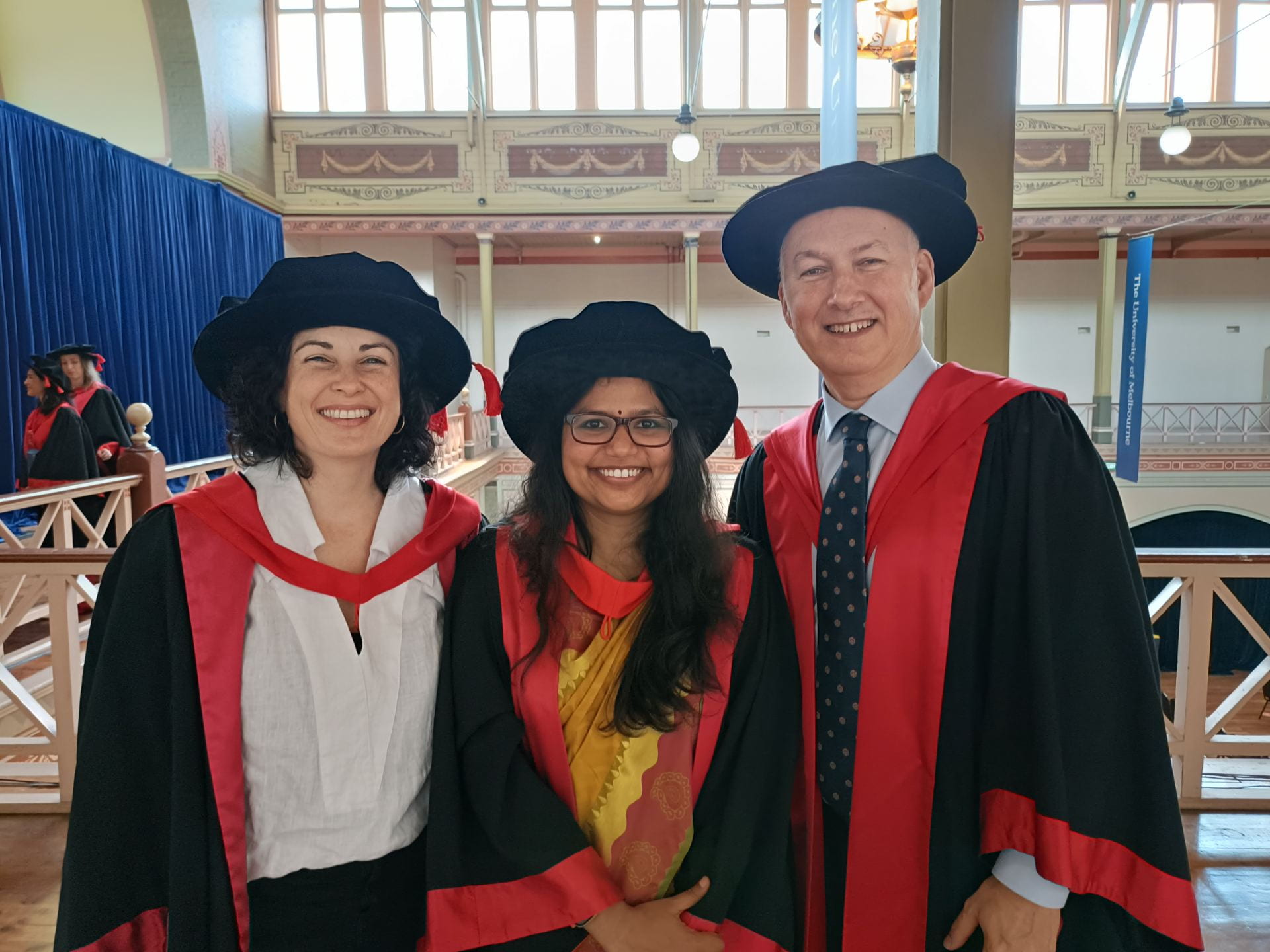
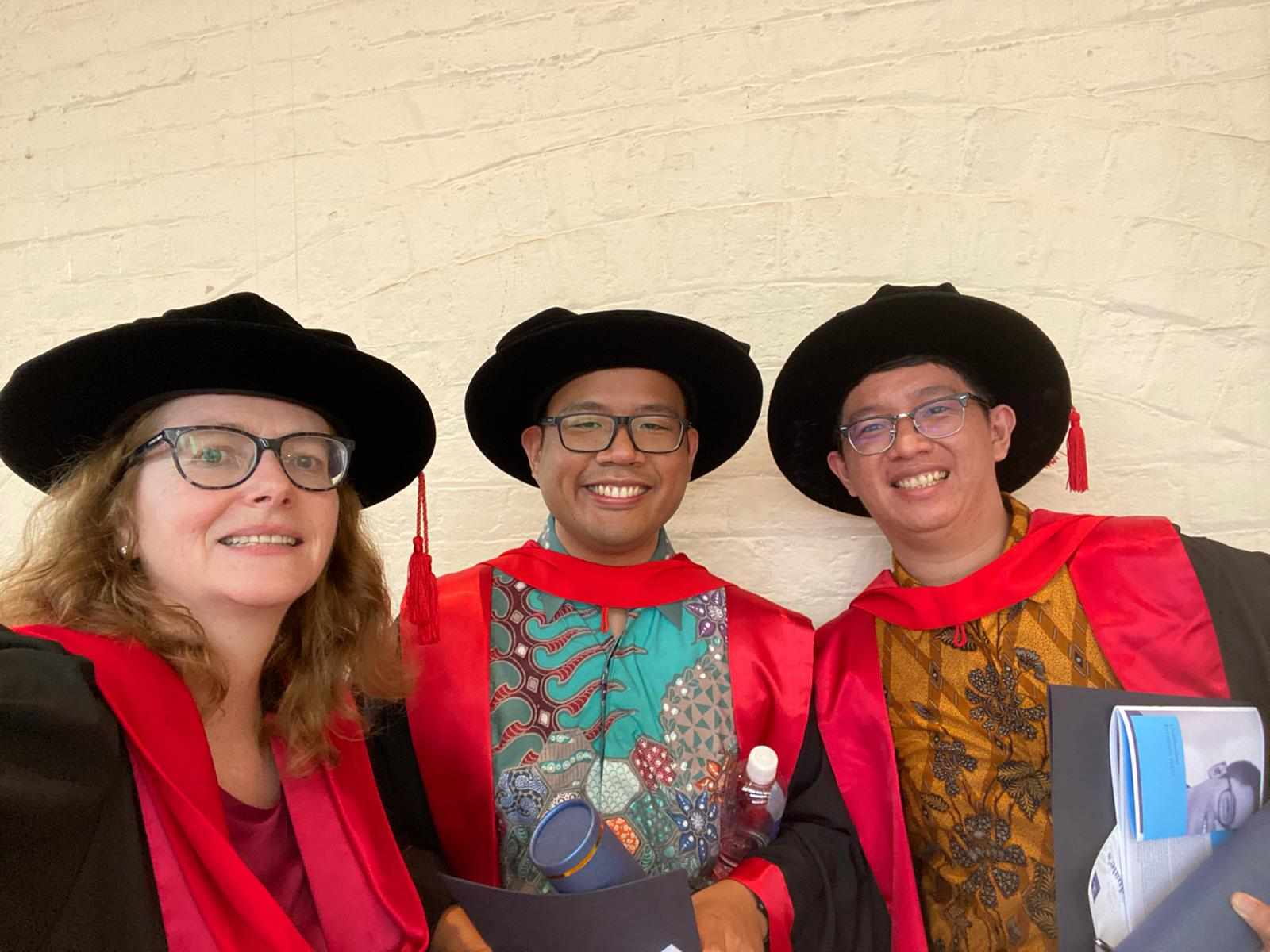

SHAPS staff, fellows, students, alumni: if you have news items for the monthly SHAPS digest, email us the details.